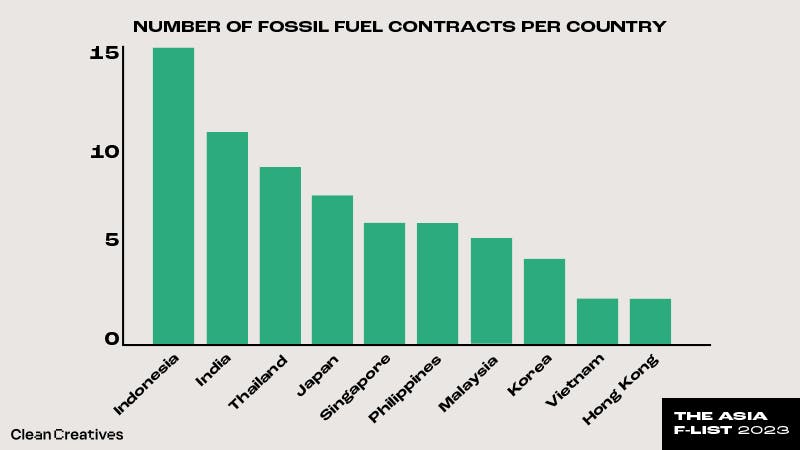New research from United States-based non-profit Clean Creatives has highlighted the ties between fossil fuels companies and the public relations and advertising firms that communicate on their behalf in Asia.
To continue reading, subscribe to Eco‑Business.
There's something for everyone. We offer a range of subscription plans.
- Access our stories and receive our Insights Weekly newsletter with the free EB Member plan.
- Unlock unlimited access to our content and archive with EB Circle.
- Publish your content with EB Premium.
The report, a first-of-its-kind study into fossil fuel advertising in the region, builds on Clean Creative’s global “F-List” published annually since 2021, with its latest edition released last month.
In the report, Clean Creatives noted that Asia has become the fastest growing region for the production and consumption of fossil fuels over the past few decades. Asia’s contribution to global greenhouse gas emissions has doubled from 22 per cent in 1990 to 44 per cent in 2019 – faster than the global average, the report pointed out.
However, fossil fuel companies in Asia are “refusing to take the opportunity to educate consumers about the climate crisis and change their business practices to save the planet.” Instead, they are convincing people to buy more and using corporate sustainability efforts to purpose-wash their negative impact on local communities, the report read.
It added that in Asia, many agencies and PR firms are proud to share their creative work for oil and gas clients, unlike in the West, where there is increasing scrutiny and stigma around fossil fuel campaigns.
Which PR and ad agencies in Asia work for the most fossil fuels firms?
Most of the PR and advertising firms that work for fossil fuels clients in Asia are headquartered in the West, where the centre of power remains for marketing communications globally.
British advertising group WPP, French agencies Publicis Groupe and Havas, as well as US-based companies Omicom and Interpublic control the most industry market share. The largest Asian communications agency is Japan’s Dentsu.
Here are the agencies in Asia that, according to the F-List, hold the most fossil fuels accounts, and the brands that they work for. Some are large multinational agencies. Some are independent firms.
Kiroyan Partners, an Indonesian independent PR firm (9 accounts)
• Asia Pacific Exploration Consolidated
• Chevron
• Donggi Senoro
• Husky
• Otto Energy
• Pertamina
• PT Nusantara Regas
• PTT Group
• Santos
WPP PR firm, Hill & Knowlton (4 accounts)
• Chevron
• ExxonMobil
• Saudi Aramco
• Shell
WPP marketing agency, VMLY&R (3 accounts)
• BP
• Chevron (Caltex)
• Thai Oil
Imogen PR, an Indonesian independent PR firm (3 accounts)
• Castrol
• Eneos
• Shell
Ensemble Worldwide, Interpublic Group’s creative agency in Malaysia (2 accounts)
• Petronas
• Shell
Chudenkbs, a Japanese independent communications agency (2 accounts)
• Chubu Electric Power Co.
• JERA
Media Buffet, an Indonesian independent PR firm (2 accounts)
• Shell
• Pertamina
Wavemaker, WPP’s marketing agency (2 accounts)
• CLP Power
• TotalEnergies
Source: F-List
Marketing tactics: ‘Talking clean but acting dirty’
More than 100 fossil fuel accounts surfaced in Clean Creatives’ scan of agencies’ work between 2022 to 2023 across 11 territories: Hong Kong, India, Indonesia, Japan, Malaysia, Myanmar, the Philippines, Singapore, South Korea, Thailand and Vietnam.
British multinational WPP, which owns well-known brands like Ogilvy and Hill+Knowlton tops the list with 22 contracts. Hill+Knowlton, for example, works with clients such as ExxonMobil, Shell and Saudi Aramco. US-based Interpublic Group (IPG), which owns Weber Shandwick, comes in second with nine accounts.
The report also highlights more than 40 independent PR agencies which work for fossil fuel brands.
China was not featured in the report because of the country’s corporate ownership structures – most oil and gas companies in China are state-owned – and state of media transparency “made it difficult to evaluate the role of agencies in fossil fuel campaigns and acquire the data needed to provide representative case studies,” the report said.
The report said that fossil fuel companies in Asia use prize campaigns and televised events to incentivise loyalty, which are easy PR tactics to “improve their reputation and distract from other issues they may be facing”. One of the examples cited in the report is Indonesian state-owned oil and gas company Pertamina’s campaign which – using the tagline “Running for a healthier Earth” – encouraged Indonesians to join the Eco RunFest, a music festival, run and community market.
The event claimed that proceeds from ticket sales would go towards Pertamina’s “Desa Energi Berdikari” initiative, which they said helped rural villages “improve welfare” and use clean energy. However, to register for the event, consumers had to first make a fuel purchase.
Pertamina claimed that by purchasing “higher quality and environmentally friendly fuel”, consumers could use their reward points to earn a voucher code which they can use on the firm’s website to make their payment and register for the event.
“Their [Pertamina’s] claim that fossil fuels are ‘environmentally friendly’ is greenwash, but the requirement for people to purchase fuel before participating in an event billed to be “Healthy for Earth” is misleading marketing at its finest,” the report reads.
Other marketing tactics used by Asian fossil fuels firms include raising awareness of the importance of recycling, promoting road safety and vehicle maintenance, and using celebrities and influencers to generate buzz around fossil fuel consumption, the report said.
“Through purpose-washing campaigns that focus on positive change like planting trees or teaching children, they mislead people into believing that they are helping the world more than hurting it,” the report said.
“Their marketing campaigns also encourage people to feel personally responsible for solving the climate crisis, and take individual actions to clean up the mess that fossil fuel companies created.”
Another example cited in the report is Indian coal giant Adani’s award-winning ’#ICan‘ campaign, which called on consumers to take personal responsibility for how their actions affect the planet. It is similar to a campaign in 2020 by Anglo-dutch oil giant Shell.
In the campaign, Adani asked its audience: “Can you lower your carbon footprint?” and “Can you be a partner in fighting global warming?”
Are fossil fuels brands seen differently in Asia?
The report notes that generally Asian consumers tend to be loyal towards oil and gas companies, because fossil fuels have aided socio-economic development in a region in which many people still live without reliable access to electricity.
“They [oil and gas companies] have helped people without energy access, even as they have endangered our planet.”
An example of this is Petronas, Malaysia’s state-owned oil and gas giant that has gained broad social acceptance locally partly through award-winning advertising campaigns run around religious festivals for decades, and globally through its sponsorship of Formula 1 racing.
Petronas was for years represented by US-based Leo Burnett, an agency made famous in Malaysia by the late creative director, writer and film director Yasmin Ahmad, who crafted some of the most awarded – and beloved – campaigns in the country’s history.
Five agencies were called out in the report for working with Petronas, including advertising agency Accenture Song and Ensemble Worldwide, owned by IPG.

Indonesia has more fossil fuels advertrising and PR contracts than any country in Asia (China is not included in the study). Image: Clean Creatives
Do Asian agencies have the clout to push back against fossil fuels brands?
Most of the region’s most powerful communications companies – for instance the UK’s WPP, France’s Publicis Groupe and American ad firm Omnicom – are headquartered in the West. Industry insiders sometimes argue that Asian offices lack the agency to push back back against decisions that determine which clients they work with, even if they wanted to.
Nayantara Dutta, research director for Clean Creatives, said that this power dynamic does not mean that local communications offices in Asia cannot wield impact.
She cited the case of Triptk, a brand consultancy owned by French group Havas, that signed up to Clean Creatives’ pledge to not work for fossil fuels clients in 2022. Its owner won the media account for oil major Shell in September this year.
“Often the way in which regional [Asian] agencies displace the blame to global headquarters is understandable, because there are issues of hierarchy and power structures to consider. But I strongly believe that any regional or local office can stand up against their global network and lead by example,” she told Eco-Business.
“Regardless of where you work and at what level you work, everyone has the power to do something within their scope of influence – to speak up no matter where they live, or in what capacity they work,” said Dutta.
She conceded that climate action in Asia is not as “blatant” as it is in the West, where public demonstations against fossil fuels influence are more common.
“
Often the way in which regional [Asian] agencies displace the blame to global headquarters is understandable, because there are issues of hierarchy and power structures to consider. But I strongly believe that any regional or local office can stand up against their global network and lead by example.
Nayantara Dutta, research director, Clean Creatives
“[The report] is an important opportunity to have a conversation about what local climate action looks like [in Asia]. And I expect that answer to be different in every single country in Asia,” she said.
Dutta noted that soon after Havas won Shell’s media account, the agency lost an account: the Fossil Fuel Non-Proliferation Treaty Initiative, a global movement against fossil fuels.
The communications sector in Asia is “ripe for disruption,” she said. “We’ve been saying this in the US and Europe for a few years now. It’s a question no agency in the largest region in the world can ignore anymore.”










